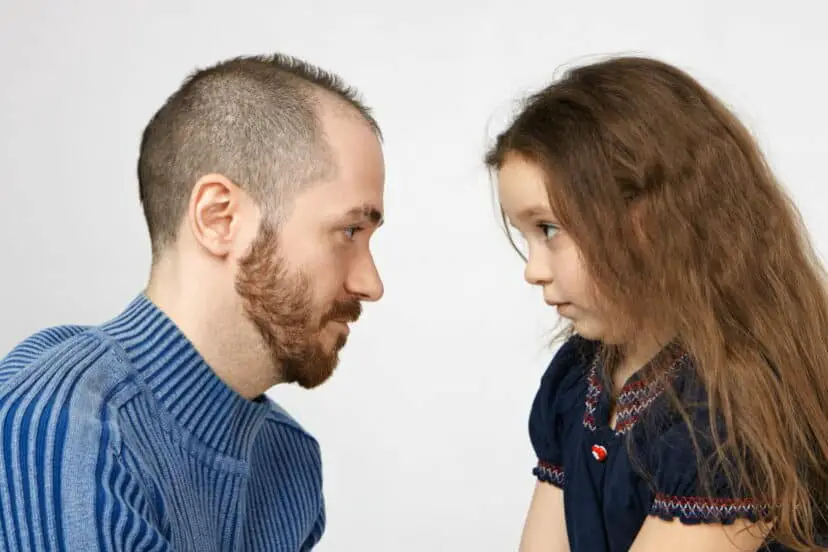Do Narcissists Make Good Fathers?
*We may earn a commission for purchases made using our links. Please see our disclosure to learn more.
Narcissists are not able to focus on anyone other than themselves. They don’t have a healthy identity, and to get what they need to prop up their self-esteem, they must manipulate other people into praising them. They need this adoration almost constantly because they are full of shame and self-loathing. This means that narcissists are unable to focus on anything else in their lives, and it also means that everyone in their life is someone to manipulate and control.
Narcissists don’t make good fathers. They see their children as extensions of their own identity, making them little more than tools to be used. That’s not a good way to raise a child, and usually does one of two things: it creates more narcissists or it creates codependent people.
The children of narcissistic fathers usually experience them as frightening and/or distant. They don’t feel the kind of love that we tend to associate with a loving parent. If you’ve had a narcissistic father, you likely understand that their abuse has created problems in your life, but you may not understand exactly why. That’s why it’s critical to examine all the reasons why narcissists don’t make good fathers.
Why Aren’t Narcissistic Fathers Good Parents?
Research conducted at the University at Buffalo has definitively shown that men are much more likely to be narcissistic than women. The researchers found specifically that, “men are more likely than women to exploit others and feel entitled to certain privileges.”

There may be cultural factors that encourage narcissistic behavior in men, but the fact remains that this kind of behavior has a dramatic effect on the narcissist’s family. This is particularly true for their children.
Children experience narcissistic fathers as distant, aloof, and outright abusive. They fear them, and their fathers never really establish a strong bond with them. Narcissistic fathers often ignore their children, and they never prioritize them.
One friend of mine, whose biological father was a narcissist, told the story about how her brother had needed corrective shoes for a minor problem when he was a child. Her father refused to buy the shoes for him, but he did buy himself a hunting bow and arrow set.
This is the kind of parenting style narcissistic fathers employ. They see everyone in the family as there to serve their needs and enhance their public image. Their wife is a trophy to show to friends and colleagues, and their children are symbols of their virility.
Their family is not composed of individuals with their own identities, needs, and desires. Instead, they are all simply extensions of the narcissist’s identity. They are there to reinforce his superiority and provide him with a steady supply of adulation.
They serve a purpose, and if they are not able to do that, they are not someone the narcissist can use. Even with their own children, the narcissistic father will devalue and discard them if they don’t give him what he needs.
Do Narcissistic Fathers Treat Their Sons Differently from Their Daughters?

Like with the narcissistic mother, there is a difference in how the narcissistic father treats his sons as opposed to his daughters. Here is some of the most important information regarding how he treats each one:
Daughters of Narcissistic Fathers
For a young girl, her father is the first relationship she experiences with a male. The daughter of a narcissistic father, however, never gets the attention she needs from her father. When he does pay attention to her, it is often to compliment or criticize her appearance. He effectively objectifies her.
He never validates her special qualities or gives her his undivided attention and time. She is left with the message that she is never enough. She is not special enough or beautiful enough or smart enough to capture her dad’s attention, and she takes those feelings and fears with her into adulthood which can have a devastating effect on her adult relationships.
Sons of Narcissistic Fathers
The sons of a narcissistic father spend their lives trying to live up to their dad’s expectations. They will never succeed because those expectations are unrealistic. Moreover, they find themselves in constant competition with their own father.
This sets up either an attitude of defeat or one of constant striving to impress him. No matter which attitude a son adopts, he will never feel as though he is good enough for his narcissistic father. Even if he does manage to succeed, he still feels empty.
How Do Children in General Experience a Narcissistic Father?
Most children of narcissistic fathers experience them in certain predictable ways. They often perceive that he is very self-centered and vain. He is not shy about showing his inflated sense of importance and entitlement.

He also will obviously use people as he sees fit. He will exploit others, including his own children, and he has the expectation that everyone will cater to his needs. When that doesn’t happen, he may erupt in the characteristic narcissistic rage.
Despite his obvious negative personality traits, most children of narcissistic fathers will remark on his ability to be charming and charismatic when he wants to be. He loves admiration from others and being in the spotlight. He’s also imaginative and prone to exaggeration.
Of course, he can’t stand any kind of criticism that typically arouses that rage again. He may even cut his own children out of his life as a result of their criticism. If he doesn’t do that, he’s aloof and incredibly unsympathetic. Many narcissistic fathers are not around their own children much.
When the family is together, the narcissistic father demands that everyone be on their best behavior so that he looks great to his friends and work colleagues. He only shows a sense of pride in his family when they are praising him.
In short, his children never get what they needed from him. While he might support them materially, they never received his attention or his affection unless he needed something from them. This is why narcissists simply don’t make good fathers.
What’s the Child of a Narcissistic Father to Do?
If these characteristics remind you of your own father and you feel as though he was narcissistic, there are several things you can do to help yourself. Recognizing his abuse is the first step. Of course, many children don’t know that these things are not normal. They don’t know that not everyone’s father is like theirs.

Once you’ve recognized the problem, you can seek help. It’s good to get help from a professional therapist if you can. They can help you work through the many ways in which your father hurt you.
Minimally, you need to accept him for who he is; acceptance helps you move beyond his abuse and into a healing space. The next step is to not let him hurt you anymore. This may mean simply walking away when he behaves inappropriately or it may mean cutting off all ties. It almost certainly requires healing your emotional triggers.
No matter how you seek help and healing, you need to adjust your expectations. It’s helpful to understand that your father has a mental problem, and that’s what’s guiding his behavior. By keeping your expectations realistic, you won’t be as disappointed when he behaves badly.
Above all, you need to remember that your self-worth is not something this narcissistic father can or should determine. You are unique and have many gifts to share with the people you love. Your narcissistic father might not appreciate those gifts, but that doesn’t diminish their beauty.
Final Thoughts
Narcissists don’t make good fathers or mothers. They are selfish and manipulative even with their own children. The children of narcissists often have lifelong problems to deal with as a result of the abuse they have suffered. It creates a vicious cycle of abuse that can span generations.
If you have a narcissistic father, it can help to know more about how you can deal with them. One thing that will help is to heal your emotional triggers so you can avoid further abuse. That’s why I created a 5 Step Roadmap to Heal Emotional Triggers. It provides you with specific steps to take to identify and heal those old wounds, many of which were likely caused by your narcissistic father. To get a free copy sent directly to your inbox, just click on this link and start healing today.
--
If you want more tips for dealing with narcissists, setting boundaries, and managing emotional triggers, make sure you subscribe to my youtube channel




